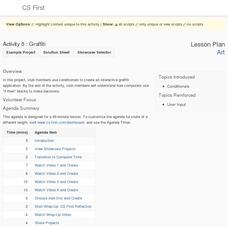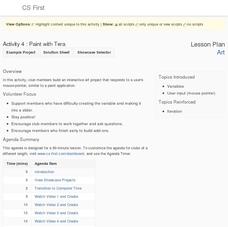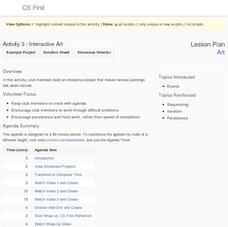Google
Art: Greeting Card
Greetings from your computer science class! The culminating activity in the eight-part Google CS Art unit has scholars create digital cards. The purpose of the cards is to show their families what they now know about programming.
Google
Art: Digital Art
There's no need to filter out the project. Future computer scientists set up a program that acts like a photography filter to complete the sixth of eight parts in the Google CS Art unit. They use the turbo mode in the Scratch coding...
Google
Art: Graffiti
Your principal won't mind graffiti, as long as it's on a virtual wall. Scholars use the Scratch block-based computer language to write a program on graffiti. The program lets users place certain designs on a wall.
Google
Art: Paint with Tera
Here's a creative resource that definitely isn't paint by numbers. As the fourth in and eight-part Art series, learners create a paint program using the Scratch block code. By completing the activity, class members come to understand the...
Google
Art: Interactive Art
What would the Mona Lisa say if she could talk? Scholars create a digital story within the Scratch block-based coding program. They make famous paintings talk and move when viewers click on them to complete the third of eight parts in...
Google
Art: Introduction and Discovery
Art isn't the first thing that comes to mind when thinking about computer science. The first installment of an eight-part Google CS Art unit introduces the series and highlights class procedures. Pupils view videos that show how to use...
Orlando Shakes
Arms and the Man: Study Guide
Few aspects of life make better fodder for a comedic play than politics. A study guide introduces George Bernard's Shaw comedy Arms and the Man. Along with summaries of each scene and brief biographies of the main characters, two lesson...
Berklee College of Music
Create Your Own Afro-Latin Groove
The backbone of Latin American music is the beat! Young musicians work on blending Afro-Latin rhythms and beat patterns before incorporating the major pentatonic, minor pentatonic, and blues scales in their own compositions.
Pittsburgh Ballet Theatre
West Side Story Suite and In The Night Fancy Free
West Side Story and Romeo & Juliet—two classics in their own rights that help young literature lovers better analyze different works. Learners research and compare the characters and story elements of West Side Story and Romeo &...
Oxford Cambridge
Set and Prop Design
What's the difference between set dressing and a prop? Between a costume accessory and a personal prop? As part of their study of set and prop design, class members engage in a series of activities that prepare them to design a prop for...
National Arts Centre
Stage-Space Awareness
Introduce scenic designers to stage-space awareness with three fun activities that demonstrate how placement on the nine stage areas convey emphasis and clarify relationships.
Brigham Young University
Introducing the Text and Learning the Process of Script Analysis
Where do directors and set designers get their ideas so that the set they build creates the mood and atmosphere the director wants for a production? From the script! Introduce theater high schoolers to the script analysis techniques used...
Brigham Young University
Understanding the Research Process
The second lesson in a unit on set design focuses on the importance of historical and stylistic research. Working in teams created in the previous session, groups consider what resources they will use as they consider design concepts for...
Brigham Young University
Creating a Design Concept
Putting together information gained from their script analysis, their readings, and their research, groups create a conceptual design statement for their assigned scene. The statement explains how their scenic design creates the mood and...
Brigham Young University
Understanding Design, Composition, and Color
The set for a play combines design elements (style, line, shape, mass, measure, position, color, and texture) and principles of composition (unity, harmony, contrast, variation, balance, proportion, and emphasis) to create a particular...
Brigham Young University
Putting Ideas Together
As part of their study of set design, theater arts students put together what they have learned so far and create a thumbnail sketch of a set that they feel captures the style and mood they want to project.
Brigham Young University
It's All in the Details
Designers communicate their vision for a set through a progression from thumbnail sketches, to drawings, to renderings. After examining a series of renderings, class members begin work on their own rendering paying particular attention...
Brigham Young University
To-Scale Models
Guided by their analysis of a scene, their initial sketches, and renderings, set designers begin to craft a scaled, 3-D model of the set of the play they have chosen.
Brigham Young University
Computer Age
Theater arts class members get a chance to see how professionals employ tech tools. As they sketch, render, build models, and prepare presentations of the set design for a current show, learners either visit a professional theater or by...
Brigham Young University
Problems? Working it Out
Working in pairs, set designers take turns sharing their sketches, explaining how their renderings articulate their concept, and receiving feedback on concerns and questions.
Brigham Young University
The Presentation
As their final act in a 10-lesson theater arts unit, set designers present their models to the class and explain how their choices of line, color, and texture support the theme they wish to convey.
Curated OER
Lesson 1- Set Design
Line, shape, color, texture, space. The first in a three-part series of lessons intended for advanced theatre arts classes introduces the elements of set design. Class members examine maquettes and analyze how designers have put together...
Curated OER
Lesson 2- Costume Design
Clothes might not make the man but they certainly do help an actor create a character. How costume designers employ the same elements of design found in sets (line, color, texture, shape) to realize a character is the focus of a lesson...
Curated OER
Lesson 3 - Lighting Design
The final lesson in a series on theatre design spotlights how lighting is incorporated into a production. After watching videos that focus on lighting fixtures and their positioning, individuals create a basic design plan for a scene,...

























